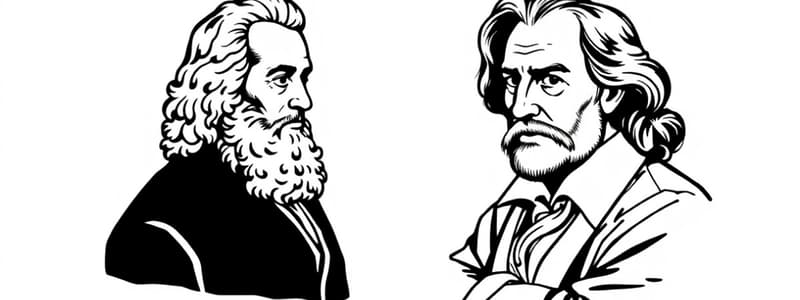Podcast
Questions and Answers
According to Hobbes, what is the primary driving force behind individual actions in the state of nature?
According to Hobbes, what is the primary driving force behind individual actions in the state of nature?
- Adherence to natural law and reason.
- Self-interest and a relentless desire for power. (correct)
- The pursuit of moral virtue and justice.
- A desire for social harmony and cooperation.
Which statement best encapsulates Hobbes' view of natural rights in the state of nature?
Which statement best encapsulates Hobbes' view of natural rights in the state of nature?
- Natural rights are fundamentally about the freedom to do whatever is necessary for self-preservation, even at the expense of others. (correct)
- Natural rights are the same as moral rights and place obligations of respect on individuals.
- Natural rights are derived from a common authority and are subject to its rules.
- Natural rights are inherent moral rights that protect life, liberty, and property.
According to Locke, what is the fundamental role of natural law in the state of nature?
According to Locke, what is the fundamental role of natural law in the state of nature?
- To establish a system of complex legal codes and regulations.
- To justify the actions of those who dominate others.
- To enforce the self-interest and desire for power of natural beings.
- To provide a framework of moral principles that guide human behavior through reason. (correct)
In Locke's view, what are the primary natural rights inherent to individuals?
In Locke's view, what are the primary natural rights inherent to individuals?
Which statement best describes a key difference between Hobbes’ and Locke’s view of the state of nature?
Which statement best describes a key difference between Hobbes’ and Locke’s view of the state of nature?
According to Locke, how are disputes generally resolved in the state of nature?
According to Locke, how are disputes generally resolved in the state of nature?
What, according to the text, is the correct understanding of Locke's conception of property in the state of nature?
What, according to the text, is the correct understanding of Locke's conception of property in the state of nature?
Which of the following statements highlights what Locke would consider a fundamental flaw of the state of nature?
Which of the following statements highlights what Locke would consider a fundamental flaw of the state of nature?
Flashcards
Hobbes' State of Nature
Hobbes' State of Nature
A state characterized by complete freedom individuals have to pursue their own interests, even violently, and is governed by no rules or authority.
Locke's State of Nature
Locke's State of Nature
A state characterized by individuals governed by natural law, which they use to reason fairly and cooperate with one another.
What is the key issue with a state of nature according to Hobbes?
What is the key issue with a state of nature according to Hobbes?
The absence of a common power or authority, leading to chaos and conflict.
What is the role of natural rights in Locke's state of nature?
What is the role of natural rights in Locke's state of nature?
Signup and view all the flashcards
What is the right of nature in Hobbes' state of nature?
What is the right of nature in Hobbes' state of nature?
Signup and view all the flashcards
What is natural law in Locke's state of nature?
What is natural law in Locke's state of nature?
Signup and view all the flashcards
What is Hobbes' view of human nature?
What is Hobbes' view of human nature?
Signup and view all the flashcards
What is Locke's view of human nature?
What is Locke's view of human nature?
Signup and view all the flashcards
Study Notes
Hobbes' State of Nature
- Hobbes viewed the state of nature as a "war of all against all," a brutal, chaotic existence.
- Individuals are driven by self-interest and a relentless pursuit of power.
- Without a common authority, justice, morality, and security are absent.
- Life in this state is described as "solitary, poor, nasty, brutish, and short."
- Natural rights are constantly threatened by potential violence and conflict.
- The "right of nature" is the freedom to do whatever is necessary for self-preservation, encompassing the pursuit of self-interest, including harming or killing others.
- These natural rights are not necessarily moral rights.
Locke's State of Nature
- Locke's view of the state of nature contrasts with Hobbes'. Natural law, a system of moral principles discoverable by reason, governs it.
- Individuals possess inherent natural rights, including life, liberty, and property.
- These rights are inalienable and cannot be taken away.
- While conflict is possible, the state of nature is not inherently violent; reason and cooperation are prominent.
- People can resolve disputes peacefully through reason and agreement.
- Natural law, inferred through reason, grants each person the right to defend their rights.
- Taking another's person or property violates natural law.
- The state of nature is not lawless but is defined by reason, respect, and fairness.
- Beneficial cooperation and trade could exist.
- The absence of a judge and enforcer of natural law poses a risk of unresolved disputes.
Key Differences Summarized
- Nature of the State of Nature: Hobbes saw the state of nature as inherently conflictual, while Locke viewed it as generally peaceful, guided by natural law.
- Human Nature: Hobbes emphasized self-interest and the constant struggle for power; Locke presented humans as capable of reason and cooperation.
- Role of Natural Law: Hobbes did not see natural law as influential in the state of nature, unlike Locke, who considered it crucial for maintaining order and fairness.
- Rights: Both philosophers recognize individual rights as fundamental, but Hobbes' focus is primarily on survival, while Locke’s encompass a broader range—life, liberty, and property.
- Necessity of Government: Hobbes advocated for an absolute sovereign to prevent societal conflict, contrasting Locke's belief in a limited government designed to protect individual rights.
Studying That Suits You
Use AI to generate personalized quizzes and flashcards to suit your learning preferences.




